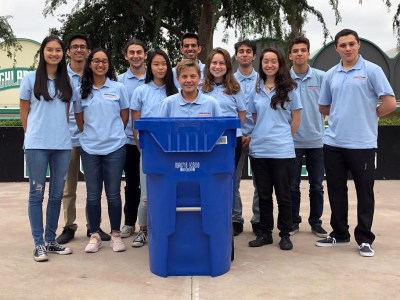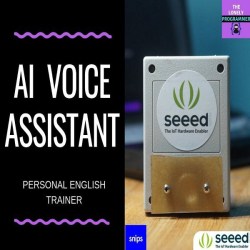Beau Ambur can often be found hosting hardware events and offering help all around the Bay Area. Now he’s turned it into a career and travels the west coast helping hackers and creators effectively leverage Kickstarter’s platform. Beau’s mentor session covers everything from, “is this project a good fit for venture capital?” to, “is open source a good fit for my project?”.
For this year’s Hackaday Prize we’ve found experts in a wide range of fields so you can take your entries to the next level regardless of the stage the project is in. The sessions are on a first come basis so sign up now for a chance to get some valuable feedback on your entry.
Your Robot Language Coach
The first project is a Personal English Trainer by the lonely programmer. As a student he noticed a need for a more interactive and portable language learning aid. Solutions do exist on the market but they are along the lines of a pocket dictionary, instructional phone app, or a full on translator. These break the flow of thought and conversation. The lonely programmer envisioned something that you can conversationally ask for help as you’re using a new language.
As many have discovered, the best way to see if there’s a need for something is to build a minimum viable product (MVP). The snips.ai platform offered the perfect foundation to quickly test out the idea. It’s working on a few words and he wants to get it ready for more people to play with the idea. The majority of the lonely programmer’s questions centered around making the project interesting for other hackers so that it could one day turn into a product.
Bolt-On Bike Assist
Rob and Shushanik are developing a project called BikeOn. It bolts to any bicycle and converts it to an electric assist bike without tools or replacing any components. BikeOn has already won some accolades such as Editors Choice at the last 2019 Makerfaire Bay Area. Rob had a few questions on how to transition a project from the proof of concept stage to the product stage. The discussion went over using open source as a tool for product promotion as well as getting funding for taking a hardware product to market.
He also wanted to know if there was anything the team could do to have a better shot at winning the prize. There were a few good tips such as directly focusing on the five categories the judges would be looking at: Concept, Design, Production, Benchmark, and Communication. It is also important to cover the development journey. Why did you make the choices you made when designing the project?
No-Spill Trash Can Concept
 Rounding out this mentor session, Jeannie and her team of highschool students demonstrate SEAL. In the area around …read more
Rounding out this mentor session, Jeannie and her team of highschool students demonstrate SEAL. In the area around …read more
Source:: Hackaday

